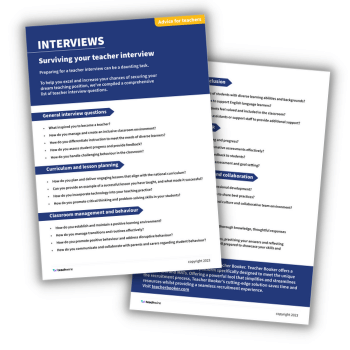Teacher interview – Candidates who aren’t shortlisted deserve an email

Teacher job applications take days, so the least school leaders can do is send out a polite rejection email to candidates who aren’t shortlisted, says Sophie Hudson…

Rejection in any form is hard, but on a professional level it can be soul-destroying.
We’ve all been there as teachers: you spend hours writing a job application, noting every GCSE you’ve got, scouring the school’s website to fine tune your cover letter.
Every teaching job application I’ve ever submitted has taken hours or even days to complete – numerous proof-checks; sending it round for people to look at.
When you’ve spent that much time applying, prepping and, dare I say, picturing yourself at the school, when you get a rejection it feels like a punch in the gut.
I vividly remember applying for my first teaching job. It was at a school that I’d attended as a child. I’d returned to do some work experience there and when a job came up, a colleague emailed me to tell me to apply.
I prepared, had my mentor look over my lesson, did a mock interview and put my heart and soul into the application.
I can’t say it went to plan – I’d saved over my lesson with a blank PowerPoint. I knew I wasn’t going to get the role, but when they finally rang to confirm my suspicions, I still struggled.
In all honesty it wasn’t even about that job. It was the rejection.
They knew me, knew my work ethic and still didn’t want me. I took it personally. In hindsight though, I wasn’t impressed with the school or the interview process.
I was made to wait two hours for my interview and didn’t even know where the toilets were. I didn’t meet the head, which I’d been told was the norm.
It felt odd and I drove home feeling a little unsettled about it. The day after the rejection I got invited to interview at my current school.
I had a tour from a group of students, taught a lesson and was so impressed with pupils’ conduct and engagement. I got such a real sense of what the school was about from the visit. This one felt different.
Luckily I got it and it’s been the perfect place for the start of my career. Even though I love my current school, I recently applied for another job.
It seemed perfect. I put so much effort into my application – I felt I had so much to offer the school.
Ten days after submitting my application I still hadn’t heard anything so emailed to enquire. The school told me I hadn’t made the shortlist.
Part of me was frustrated. I worked solidly for two days and two evenings to write my application and they didn’t even tell me ‘no’ until I emailed. Rejected, again.
What had I done wrong? What could I have done differently?
When you spend hours and days writing an application only for it to be disregarded it’s hard to deal with. If the same thing has happened to you, know that you’re not alone. Facing rejection helps build your resilience.
It’s OK to feel sad or angry, but I promise it does pass. Keep your head up high. Everything happens for a reason – I truly believe that.
My plea to school leaders is this: even if you have 100 applications, please be considerate and email those who applied to tell them they were not shortlisted.
Even a generic message is enough. For those ten days when I was waiting for news of my application I was a mess.
My heart raced every time an email arrived and I checked my phone more times than I care to admit. I had to chase up to get any closure.
The teaching job market seems particularly tough at the moment, so my advice, especially to trainees, is to persevere. Rejection does not mean failure.
Sophie Hudson is a secondary teacher in London. Find her on Twitter at @misshudsonhist. Visit her website here. Read advice about teacher interview questions.











